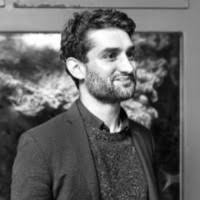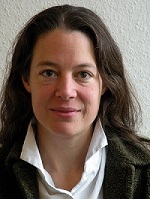
Benjamin Fischer,
former President
of the European Union
of Jewish Students
I Stay Home,
I Remember
by Muriel Mirak-Weissbach
FRANKFURT, APRIL 30, 2020 — Every year on April 24, the French Cathedral in Berlin welcomes Armenians and Germans to commemorate the anniversary of the 1915 genocide. I usually travel to the capital for the solemn ceremony. In Frankfurt, the historic Paulskirche is the venue for a parallel ceremony that my husband regularly attends.
Every year, but not this year.
Due to the extraordinary circumstances created by the coronavirus pandemic, tradition had to bow to necessity. But a commemoration did take place. Thanks to the AGBU Germany and the Deutsch-Armenisches Forum, prominent members of the Armenian community, as well as representatives of other victimized communities, were able to join with personalities from German political life and talented Armenian musicians, to pay homage to the memory of those who perished. Under the rubric, “Stay Home and Remember,” the relatively new German chapter of the AGBU and the forum founded in 2015 by CDU/CSU parliamentarian Albert Weiler, provided an online encounter for participants from many countries — all appearing from their home offices, often with banners visible: “I stay home, I remember.”
It is important, AGBU Germany President Nadia Gortzounian said, to remember the genocide not only of the Armenians, but — as genocide is a crime against humanity — of all those who have been or are being threatened. In commemorating the death of the victims, we at the same time honoring the resilience of the survivors.
Thus, Dariyel Damir, representing the Aramaic community in Germany, noted that it is usually on June 15 that they join with Armenians and Greeks, to commemorate massacres of their people in Mardin, Urfa and so many other Ottoman locations. Just two days earlier, they had gathered to remember the more recent persecutions of Christians in war-torn Syria and Iraq; it was seven years ago on that day that two Archbishops had been kidnapped and not seen since. Damir recalled the words of Interior Minister Talaat Pasha a century ago, who explained that the Young Turks aimed to utilize the conditions created by the world war to rid the Ottoman empire of its Christian populations without being disturbed.
Messages came also from representatives of communities persecuted by Nazism. Emran Elmazi, read a message by Romani Rose, chairman of the Central Council of the Sinti and Roma, communities subjected to the worst crimes of Hitler. Traumatized, like the Armenians, they too demand recognition; it is not only a question of justice but also a means of defeating racism in today’s world.
Speaking for the Jewish community was Benjamin Fischer, former President of the European Union of Jewish Students, and Henryk M. Broder, journalist and author. Broder, a prominent voice in Germany, highlighted the experiences and traits that Jews and Armenians share. The Armenian Genocide was “a blueprint for the Holocaust,” he said, and he honored both peoples for their indomitable will to survive.

Prof. Elke Hartmann
Remembrance and Reconciliation
The first of three political figures who participated, parliamentarian Michael G. Link, member of the national leadership of the FDP (Liberal Party), underlined the importance of recognition of the genocide. Albert H. Weiler recalled the breakthrough on June 2, 2016, when the Bundestag (Parliament) officially and unanimously passed a resolution recognizing the genocide. Regretting that the same has not occurred in Turkey, Weiler expressed optimism, however, that the theme has found its place in political discourse in Turkey, and stressed the need to respect and support those who are courageously campaigning for justice. Without recognition, he stated, there can be no reconciliation or friendship.
Cem Özdemir, of Turkish heritage and a parliamentarian for the Green Party, was among those leading the drive for the Bundestag resolution. Recognition, he said, is important not only for Armenians, but also for Germans, in light of the role Imperial Germany, the Ottoman Empire’s wartime ally, played at the time. German diplomats and others knew what was unfolding, but turned a blind eye. In this sense it is important to raise the issue of complicity, and it has been raised. As for the role of Turkey and Turks today, Özdemir said it is not a question of guilt but responsibility, to ensure the same does not happen again, and made reference to the massacre of Kurds in Dersim in 1938. He quoted Hrant Dink, from whom he first learned about the Armenian genocide, on the fact that Turkey had an “official history” and a “true history.”
To illustrate his “vision” of future relations, Özdemir cited the precedents of German-French and German-Polish reconciliation; although the Germans in World War II committed the most atrocious crimes against both, today the borders are open, young people study and work in their neighboring countries. “My vision,” he said, “is that one day the border between Turkey and the Republic of Armenia will be open.” It is the responsibility of the later generation, he concluded, to oppose racist madness; “we owe it to the victims.”
The Deeper Meaning of Survival
The central issue the unique online encounter tackled and most movingly treated was the question: what does it mean to survive? Articulated in words and music, the answer was: survival is more than staying alive; survival means continuing to live on, in one’s own meaningful existence, and to provide for the next generation, and those coming thereafter. It means keeping one’s own identity alive, and that of one’s family and community. It means above all, preserving the history and culture of the people, and developing cultural excellence further.
This message was embedded in the very format of the event, whereby personal remarks and greetings alternated with brief musical offerings, whether on the piano, on the flute or violin, or vocally. The pieces performed were either classical works, by Bach or Chopin (Ronja Tischkov), Komitas (Gurgen Baveyan, Nora Shekyan), Rachmaninoff (Narek Alarverdyan), for example, or new works by contemporary composers, sometimes even compositions by the young performers themselves. Tamar Eskenian presented her 2018 piece, In Memorium, on a traditional Armenian flute. A brief recorded selection of Eduard Bagdasarian, by world class musicians Sergey and Lusine Khachatryan (violin and piano) illustrated the achievements of the current generation.
Prof. Elke Hartmann, who teaches Turkology at Hamburg University, developed the concept of cultural survival in a presentation of the Houshamadyan project, which she cofounded in 2010 together with other descendants of genocide survivors. The meaning of April 24, she said, is different for each generation. The Houshamadyan, which is a website, provides the space for a new form of memory, in that it researches Armenian life in the Ottoman Empire prior to the genocide, and, by documenting the loss, brings the villages and towns back to life. She showed how the website works, how someone today might search for information about life in the village where one’s ancestors lived. The richly illustrated material comes from individuals who have made available memoirs and photographs of family members and of precious personal items saved from destruction. “Perhaps one might find where one’s grandparents or great-grandparents lived and where they went,” she said, adding that such reconstruction of a past threatened with annihilation is of extreme importance especially for the younger generations today.
Vahan Alaverdyan, father of pianist Narek, who had played an etude by Rachmaninoff, addressed the same matter in personal terms. Now, in springtime, he began, when we all rejoice in Nature’s awakening, we think back 105 years, when that spring brought not life, but death. It was a death that humanity had not seen before, the death of two-thirds of a people in a short time. Yet through a miracle, there were those who managed through an invincible will to save themselves, to leave Armenia and to spread throughout the world. One of those survivors, a seven-year-old girl, he explained, was his grandmother, the great-grandmother of the young pianist who had just performed. Through her having survived, 38 members of the family came into this world, among them, he and his son. Each generation, he said, has a different task, first to survive, then to remember, to resurrect. In springtime when we celebrate resurrection, for Armenians, it is a celebration of survival and culture, which go hand in hand. Through self-realization and the creation of culture, the following generations defy the genocide.
It was precisely the several musical offerings interspersed in the program, masterful performances by members of the youngest generation diaspora Armenians that represented a proud defiance of genocide.
Concluding the commemoration, as always, was a religious service. Bishop Serovpé Isakhanyan, Primate of the Diocese of the Armenian Church in Germany, joined by two clergymen, officiated in an otherwise empty church. Following the service in Armenian, he addressed the virtual participants in German, and elaborated on the message of Easter. In celebrating the resurrection, we celebrate the victory of life over death, he said, comparing the martyrdom of the Armenians in the genocide 105 years ago to the crucifixion, and stressing the importance of the fight for justice, liberty and truth in the shadow of this death. It took many years, he went on, for our ancestors to overcome the trauma, to look to the future with confidence. He said that remembrance and the fight for justice have united millions of Armenians, something that even the terrible Corona virus pandemic cannot prevent. There is no desire for enmity, he concluded, but a commitment to remembrance and demand for justice.
We stayed home and remembered.